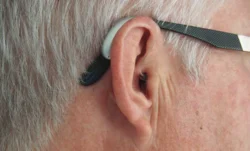Have you ever felt ringing or other noises in one or even both of your ears with no external source? If that’s the case, you have experienced something known as tinnitus, and according to research, you’re not the only one. In fact, over 50 million Americans experience some form of tinnitus, with 20 million having chronic tinnitus. And while usually, tinnitus is connected with age-related hearing loss, sometimes it is caused by TMJ.
Luckily, there are a variety of different treatments, such as botox for TMJ at Arborviewsurgery, that can help against the disorder. But how can you figure out if you are dealing with TMJ? And more importantly, what can you do about tinnitus if you can’t go to a doctor?
What Is TMJ?
The temporomandibular joint is a complex joint that allows us to move our jaw side-to-side and front to back, especially when eating. Even though the joint is strong, it has to withstand immense pressure caused by the muscles that make the jaw move. As a result, the TMJ is always at risk of damage which is often caused by trauma such as a pulled muscle or dislocation. It’s also worth mentioning that arthritis can also cause TMJ problems and pain in the area.
What Is Tinnitus?
As previously mentioned, tinnitus is a disorder that causes people to hear ringing or other noises in their ears. And while it may seem that the sound comes from an external source, it is, in fact, an internal vibration. Generally speaking, tinnitus is caused by an underlying condition, such as an ear injury, age-related hearing loss, and circulatory system issues. Therefore, the most effective way to reduce or eliminate the noise entirely is to treat the underlying cause.
Why Can TMJ Cause Tinnitus?
Although there is still some debate about the connection between TMJ and tinnitus, most doctors came up with three theories about it:
- The chewing muscles are near a group of other muscles that insert into the middle ear. When eating, the pressure that TMJ faces can have an effect on hearing and thus, trigger tinnitus.
- The nerves from the TMJ are connected to parts of our brain that handle hearing and sound interpretation. As a result, if the TMJ experiences pressure, our brain might have trouble processing sound, which could cause tinnitus.
- Some doctors believe that there is a direct link between the ligaments that attach to the jaw and one of the hearing bones from the middle ear. Thus, pain and pressure are shared between them, often increasing the severity of tinnitus.
Nevertheless, one thing is certain — problems with the TMJ will most likely trigger or aggravate any pre-existing tinnitus.
How Do I Know If I Have TMJ Problems?
Even though only a professional can diagnose TMJ problems, there are a few symptoms that will warrant a dentist appointment. For example, if you constantly experience pain, such as earaches or headaches, you may be dealing with a TMJ disorder. Similarly, neck pains, joint swelling, or limitation of jaw movement are clear signs that something is wrong with your TMJ. And lastly, teeth grinding, especially at night, is a sign that your TMJ might be subjected to too much pressure.
What Can I Do About TMJ And Tinnitus?
As noted earlier, treating TMJ problems will most likely reduce or even eliminate tinnitus entirely. From diet changes to botox injections, there are a variety of ways to handle TMJ disorders.
Home TMJ Treatments
Usually, extreme pressure is what causes most TMJ disorders, and that’s why you should do your best to avoid it. For instance, switching to a soft diet will help reduce the pressure you put on your TMJ when eating. As a result, your TMJ will experience less pressure and will soon get back to normal.
If your TMJ is caused by jaw clenching or teeth grinding, a bite appliance can be used to correct the way in which your jaw works. You can find DIY bite appliances at your local pharmacy, or you can have one specially designed by your dentist.
However, if nothing works and you still experience pain and discomfort, you will need to go to a dentist. Until you manage to do so, you can take anti-inflammatory medicine and painkillers to handle the pain.
Professional TMJ Treatments
When it comes to professional TMJ treatments, your dentist will typically recommend a bite appliance or botox injections. Generally speaking, the latter is more efficient and faster, if more expensive.
But how does it work? The botox treatment session takes between 10-30 minutes, during which the dentist will inject botox into your jaw muscles, forehead, and temple. Even though the procedure can cause some discomfort, it will go away in a few days. Then, you will have to repeat the procedure at least three times over the course of several months. It’s also important to mention that botox injections have a high success rate in treating TMJ disorders and relieving tinnitus.
TMJ Prevention Tips
While there are a variety of ways to treat TMJ tinnitus, prevention is always better than cure. The following tips will help relieve TMJ pressure and prevent further damage to your jaw:
- Avoid Stress: Stress can cause you to grind your teeth or clench your jaw, which are both risk factors for TMJ. You should find ways to deal with stress, such as yoga, meditation, and message.
- Watch Out for Gum: Chewing gum requires immense force from the jaw muscles, which will then put pressure on your TMJ. As a result, avoid chewing too much gum as it can overuse and stress your jaw.
- Avoid Hard Foods: Similar to gum; hard foods will make your jaw work harder than usual. Therefore, it’s important to add some variety to your diet and give your jaw a break from crunchy and hard foods.
- Visit Your Dentist: Regular dentist checks will help detect most dental and mouth problems, including TMJ. We recommend you visit your dentist at least twice per year for a routine checkup.
Conclusion
Overall, it’s easy to see why TMJ problems could cause a variety of disorders such as tinnitus. However, while TMJ tinnitus is annoying and can disrupt your daily routine, you can also treat it easily. From lifestyle changes to botox injections, nowadays, dentists can handle TMJ in just a few appointments. And remember that you can prevent most TMJ-related problems by visiting your dentist.







